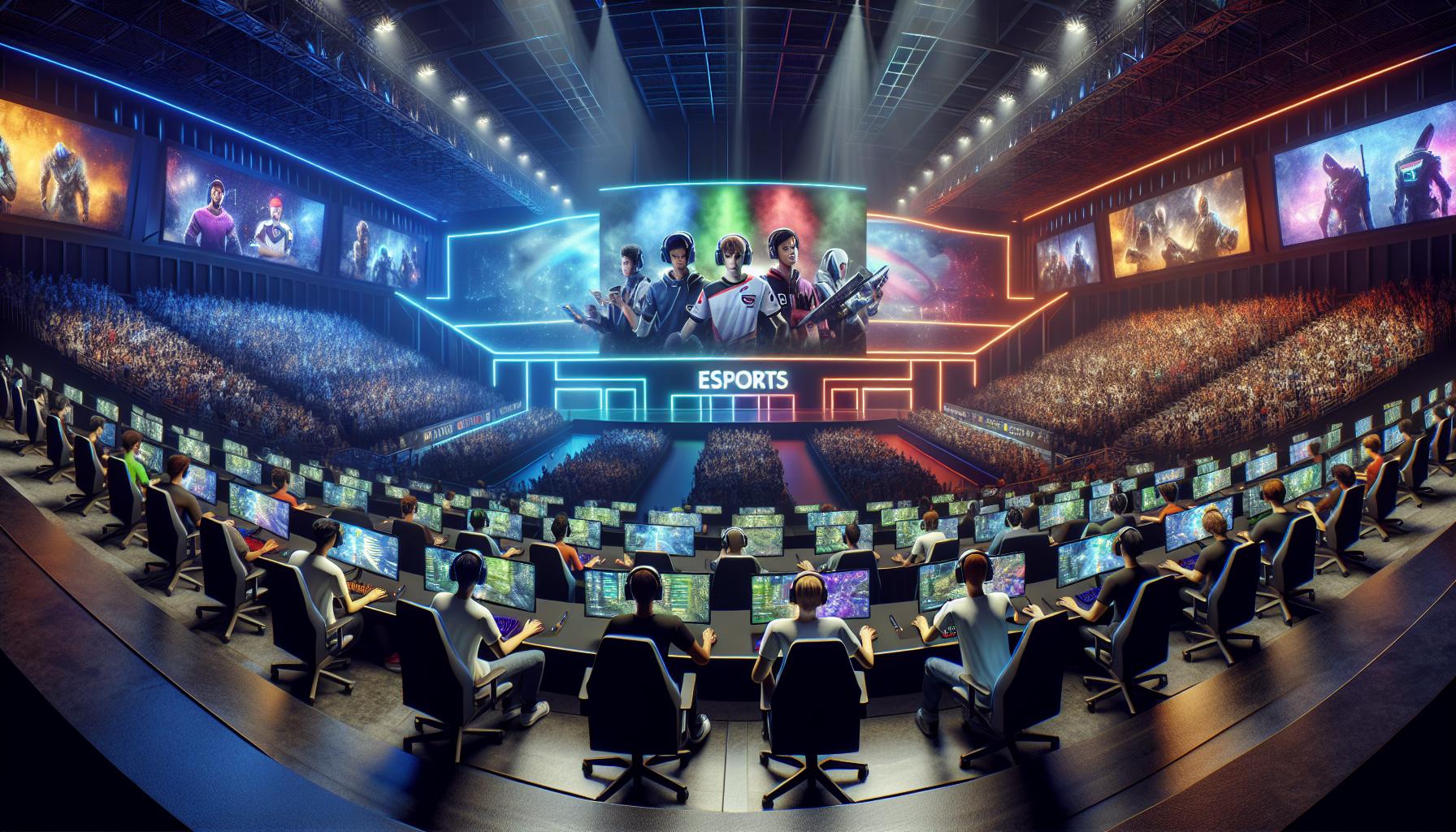The world of esports has exploded in recent years, transforming from a niche pastime into a multi-billion dollar industry. As competitive gaming garners more attention, the financial landscape surrounding esports entertainment stocks is becoming increasingly intriguing. Investors are eager to tap into this growing market, but navigating it can be tricky.
I’ve watched as esports events fill arenas and streaming platforms draw millions of viewers. With big names like Activision Blizzard and Electronic Arts leading the charge, understanding the dynamics of esports stocks has never been more essential. In this article, I’ll dive into the key factors influencing these stocks and what potential investors need to consider before diving in.
Key Takeaways
Rapid Industry Growth: The esports market is projected to reach $1.8 billion by 2023, attracting significant investor interest in esports entertainment stocks.
Major Players: Companies like Activision Blizzard, Electronic Arts, Riot Games, Tencent, and Take-Two Interactive are dominating the esports landscape and represent key investment opportunities.
Viewership Trends: Esports viewership is surpassing traditional sports, with platforms like Twitch and YouTube facilitating extensive audience engagement, boosting advertising revenues.
Emerging Technologies: The integration of mobile gaming (almost 50% of global gaming revenues) and blockchain technology presents new monetization opportunities and potential for innovation within the industry.
Investment Strategy: Investors should consider both long-term and short-term strategies, balancing potential gains with inherent risks associated with market volatility and regulatory changes.
Regulatory Landscape: As esports continues to mature, evolving regulations will impact growth and require continuous adaptation from companies within the sector.
Esports Entertainment Stock
Esports entertainment stock represents shares in companies engaged in the flourishing esports industry. This market includes game developers, streaming platforms, and event organizers. The significant growth of the industry, projected to reach $1.8 billion by 2023, attracts considerable investor interest.
Major players, such as Activision Blizzard and Electronic Arts, dominate the sector. Activision Blizzard, known for titles like Call of Duty and Overwatch, enhances stock value through franchise development and live events. Electronic Arts focuses on popular games like FIFA and Madden NFL, expanding its audience through competitive gaming.
Investors assess multiple factors when considering esports stocks. Market demand, viewer engagement, and technological advancements drive the industry’s evolution. Regulatory changes and competition pose risks, affecting stock performance and investor confidence.
In addition, emerging trends like mobile gaming and blockchain are becoming increasingly relevant. Mobile gaming accounts for nearly 50% of global gaming revenues, demonstrating the sector’s broad appeal. Blockchain technology offers opportunities in game ownership and asset trading, potentially reshaping investment strategies.
Tracking esports entertainment stock requires attention to earnings reports and market trends. Staying informed about upcoming game releases and tournament schedules helps gauge potential growth. Emphasizing a diversified investment portfolio can mitigate risks associated with volatile stocks.
Key Players in the Esports Industry

The esports industry encompasses a variety of companies driving its rapid expansion. Understanding these key players provides insight into investment opportunities and market dynamics.
Major Companies Involved
- Activision Blizzard
Activision Blizzard owns franchises like Call of Duty and Overwatch. By organizing competitive leagues, it enhances viewer engagement and boosts stock value. - Electronic Arts (EA)
EA leads in sports video games such as FIFA and Madden NFL. It focuses on community-driven events, thus increasing player participation and viewership. - Riot Games
Riot Games, known for League of Legends, hosts the World Championship, drawing millions of viewers. Its investment in esports infrastructure positions it as a major player. - Tencent
Tencent, a Chinese tech giant, holds stakes in various gaming enterprises, including Riot and Epic Games. Its influence in mobile gaming offers substantial growth potential. - Take-Two Interactive
Take-Two develops popular franchises like NBA 2K. Its foray into competitive gaming highlights the blending of traditional sports with esports.
- Increased Viewership
Esports viewership surpasses traditional sports, with platforms like Twitch and YouTube hosting millions of live events. Such growth fosters a larger advertising market. - Mobile Gaming Surge
Mobile gaming accounts for nearly 50% of global gaming revenues. This trend opens avenues for companies focused on casual gaming experiences. - Blockchain Integration
Blockchain technology introduces new monetization avenues through non-fungible tokens (NFTs) and secure transactions. It potentially revolutionizes ownership in digital assets. - Sponsorship Expansion
Companies across various sectors invest in esports sponsorships. Brand collaborations enhance revenue streams and elevate market visibility. - Regulatory Developments
As esports matures, regulatory scrutiny increases. Adapting to these changes is crucial for companies targeting long-term growth.
Analyzing these key players and market trends reveals significant investment opportunities within the esports entertainment stock sector.
Investment Considerations

Navigating esports entertainment stocks requires careful consideration of various factors. Understanding the inherent risks and potential investment timelines proves essential for making informed decisions.
Risks and Challenges
Identifying risks within the esports market is crucial for investors. Regulatory changes can introduce uncertainties that affect profitability. Competition among companies and platforms can also lead to market saturation, impacting stock performance. Volatility in viewer engagement presents another challenge; shifts in consumer interest can quickly alter revenue projections. Moreover, technological advancements require continuous adaptation, and companies that fail to innovate may struggle. For example, reliance on outdated gaming models might lead to a decline in market share. Investors must remain vigilant and conduct ongoing research to stay ahead of these evolving dynamics.
Long-Term vs Short-Term Investment
Deciding between long-term or short-term investments in esports stocks significantly influences portfolio performance. Long-term investments allow for capitalizing on growth trends and market maturation. Companies investing in robust development strategies may see sustained appreciation over time. Short-term investments, however, focus on immediate market reactions to events, such as game releases or tournament outcomes. These opportunities can yield quick returns but involve higher risks due to market volatility. Balancing both investment strategies can provide diversification, reducing risk while capturing potential gains in this rapidly changing industry.
Future Outlook for Esports Entertainment Stock

The future of esports entertainment stock appears promising, driven by several key factors. Market growth trends indicate substantial revenue increases, building on the $1.8 billion projected for 2023. Continued investor interest is likely as the industry matures and expands.
Major players such as Activision Blizzard and Electronic Arts will likely lead the charge. Activision Blizzard’s focus on franchise development and live esports events enhances its market position. Electronic Arts will probably continue diversifying its competitive gaming offerings, attracting a wider audience and fostering engagement.
Technological advancements shape the industry’s trajectory. The rise of mobile gaming, accounting for nearly 50% of global gaming revenues, creates lucrative investment opportunities. Companies embracing blockchain technology and other innovations can unlock new revenue streams while improving user experiences.
Viewership trends further bolster forecasts. Esports viewership has surpassed traditional sports, leveraging platforms like Twitch and YouTube for expansive reach. The increasing popularity of esports events attracts sponsorships, enhancing financial support for key players in the sector.
However, potential risks remain. Regulatory scrutiny can impact growth, as companies navigate compliance with evolving laws. Competition within the gaming space also poses challenges, requiring ongoing innovation to maintain market share.
Investing in esports entertainment stock necessitates careful analysis. Evaluating earnings reports and market conditions remains crucial for balancing risk and reward. Understanding the nuances between long-term and short-term strategies can guide investment decisions, positioning investors to capture growth and mitigate volatility.
The outlook for esports entertainment stock appears robust, driven by market expansion, technological innovation, and deepening audience engagement. Evaluating these elements will be essential for anyone considering investments in this dynamic sector.
The Esports Entertainment Stock Market
The esports entertainment stock market presents a unique and exciting opportunity for investors. With the industry’s rapid growth and increasing viewer engagement it’s clear that there’s significant potential for profit. As I navigate this dynamic landscape I recognize the importance of staying informed about market trends and technological advancements.
Balancing long-term and short-term investment strategies can help mitigate risks while maximizing potential returns. Companies like Activision Blizzard and Electronic Arts are at the forefront of this evolution and their innovations will likely shape the future.
As the esports sector continues to mature I’m optimistic about the prospects ahead. Keeping an eye on emerging trends and understanding the complexities will be key in making informed investment decisions in this vibrant market.